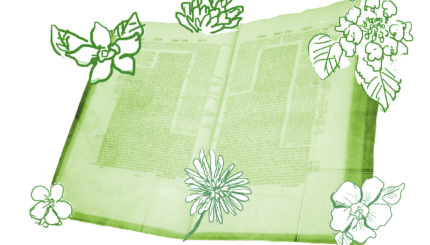Today’s daf reads like a compendium of seder highlights from the Four Questions (check it out — it’s slightly different from the version you might know!) to the key symbols of the seder (matzah, maror and the paschal lamb), to the profound experiential nature of the seder. It’s all here, and all treated rather quickly, especially in comparison to the pages and pages of detail we read on the sacrifice. This tells you something about the rabbinic perspective on Passover: the sacrifice was the ultimate ritual of the holiday, everything else was secondary.
While the paschal sacrifice is all about serving God, the recurring and most essential theme of the Passover meal is the education of the next generation. Here’s the mishnah on today’s page:
They pour the second cup and here the son asks his father.
And if the son does not have the intelligence, the father teaches him.
Notice that the mishnah does not have in mind a fixed set of questions. Instead, it imagines that the child spontaneously asks his father to explain this unusual meal and strange foods. But even if the child doesn’t automatically ask, the father teaches him anyway.
Rabbi Sholom Mordechai Schwadron, known as the Maharsham, explains that the purpose of seder is to retell the story of the Exodus (other rabbinic texts seem to think the purpose is to explain the laws of Passover). Asking questions, for him, are a means to that end. There is no need, therefore, in this moment, to force them. If the child doesn’t ask, the father just launches into the story anyway.
But the Gemara offers a different script for the second cup, based on a beraita, an early rabbinic teaching from the same period as the Mishnah:
The sages taught: If his son is wise, he asks him (the father). And if the son is not wise, his wife asks him. And if even his wife is not capable of asking (or if he has no wife), he asks himself. And even if two Torah scholars who know the halakhot of Passover are sitting together (and there is no one else present to pose the questions) they ask each other.
Here, the questions become as important as the telling — perhaps even more important. If the son does not ask the questions, someone else — a wife, a colleague, the seder leader himself — must. Teaching alone is not enough, asking is an essential part of the ritual.
The origin of this perspective is likely scriptural. Exodus 12:26–7 reads: And when your children ask you, “What do you mean by this rite?” you shall say to them … The rabbis understand from this that asking, not just telling, is required.
But the rabbis don’t go so far as to script the questions. In fact, if you read carefully, the so-called Four Questions that we recite as part of the seder, a version of which are found on this page, are not even questions — they’re prompts, designed to elicit questions. The actual questions are meant to change from household to household, from year to year, from generation to generation.
Dr. Erica Brown sees the seder table as the ancient classroom in Jewish history, and in her book Spiritual Boredom, she explains the wisdom of this approach:
“The purpose of Passover is not to tell our children the story of Jewish peoplehood; it is to make the evening interesting enough for them to ask questions. Telling, especially repeated telling, leads to a flat story with a dull landscape. Asking leads to exploration, further questioning, engagement, creativity.”
It is not enough to tell the story, to simply read or repeat what you’ve known. Because far less than answers, the questions themselves, whether about double dipping or freedom, inspire us.
Read all of Pesachim 116 on Sefaria.
This piece originally appeared in a My Jewish Learning Daf Yomi email newsletter sent on March 17th, 2021. If you are interested in receiving the newsletter, sign up here.



